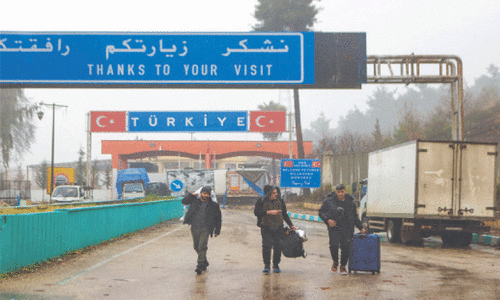ANKARA, Aug 8: Kurdish rebels threatened more attacks on economic targets on Friday after claiming responsibility for a blast in eastern Turkey that shut down a strategic oil pipeline, an agency close to the rebels reported.
“Attacks on economic interests have a deterring effect (on Turkey)... As long as the Turkish state insists on war, such acts will be naturally carried out,” Bahoz Erdal, a commander of the separatist Kurdistan Workers’ Party (PKK), told the Firat news agency.
The PKK claimed responsibility for a blast on Tuesday night at a section of the Baku-Tbilisi-Ceyhan (BTC) oil pipeline near Refahiye, in Erzincan province.
The explosion sparked a fire, which continued to burn on Friday, triggering fresh jitters at the world oil markets.
The conduit, which supplies oil to Western markets, is expected to remain shut for about 15 days.
The PKK said the explosion was “an act of sabotage” by its militants, details of which would be revealed later, according to Firat.
The PKK, listed as a terrorist group by Turkey and much of the international community, has sabotaged gas and oil pipelines in the past as part of its armed campaign for self-rule in the mainly Kurdish southeast.
Erdal said the pipeline blast and other PKK attacks in recent weeks were in response to an intensified Turkish crackdown against the rebels both inside Turkey and neighbouring northern Iraq, where they take refuge.
Turkish military action “has required us to boost our resistance in self-defence,” he told Firat.
The Turkish authorities have played down the possibility of a sabotage at the BTC pipeline, and the Anatolia news agency on Friday quoted unnamed officials as saying that the PKK might be seeking publicity.
An official from Turkey’s state-run oil and gas company, BOTAS, said on Thursday that no trace of a sabotage had been found but a definite conclusion could be reached only after the fire at the pipeline was extinguished.
The Refahiye’s sub-governor had earlier ruled out sabotage, saying a fault had been detected before the blast.
Inaugurated in 2006, the 1,774-kilometre BTC pipeline is the world’s second longest.
It carries Azeri oil from the Caspian Sea fields, the world’s third largest reserve, to Turkey’s Mediterranean port of Ceyhan, from where tankers transport the crude to Western markets.
It was pumping about 1.2 million barrels of oil per day before the blast.
Analysts suggested the shutdown could last longer than Turkish officials estimate and British energy giant BP said it was looking at alternative means of delivering supplies to Western clients.
The PKK took up arms for Kurdish self-rule in Turkey’s southeast in 1984, sparking a conflict that has claimed more than 37,000 lives.
Turkish warplanes have staged air raids against PKK bases in northern Iraq since December, helped by US intelligence on rebel movements in the region.
In February, the army also conducted a week-long ground incursion in northern Iraq, killing at least 240 PKK militants and destroying dozens of hideouts, training camps and ammunition depots.
Last week, the Turkish authorities blamed the PKK for two bomb blasts in Istanbul on July 27, which killed 17 people, including five children, and injured more than 150.
On Wednesday night, the rebels fired rockets at a police station in the eastern town of Malazgirt, killing a policeman and wounding three others. —AFP














































Dear visitor, the comments section is undergoing an overhaul and will return soon.